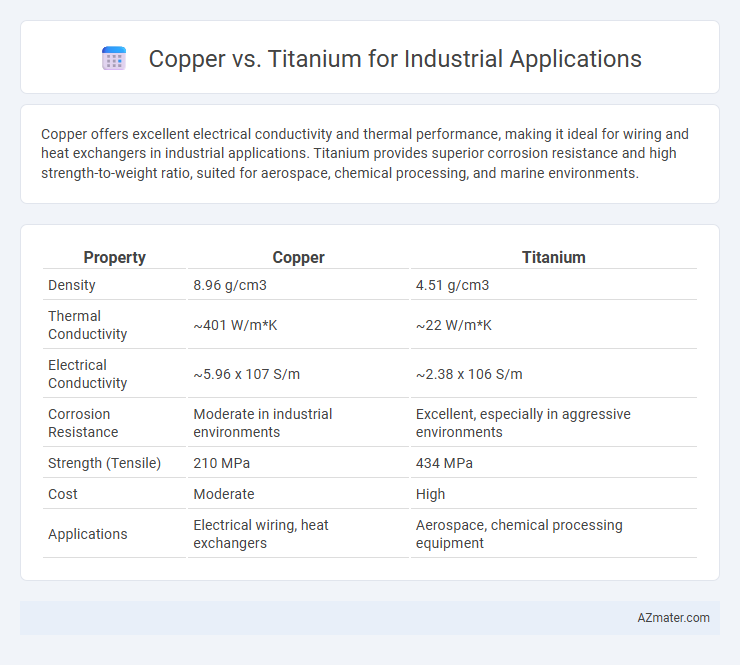Copper offers excellent electrical conductivity and thermal performance, making it ideal for wiring and heat exchangers in industrial applications. Titanium provides superior corrosion resistance and high strength-to-weight ratio, suited for aerospace, chemical processing, and marine environments.
Table of Comparison
| Property | Copper | Titanium |
|---|---|---|
| Density | 8.96 g/cm3 | 4.51 g/cm3 |
| Thermal Conductivity | ~401 W/m*K | ~22 W/m*K |
| Electrical Conductivity | ~5.96 x 107 S/m | ~2.38 x 106 S/m |
| Corrosion Resistance | Moderate in industrial environments | Excellent, especially in aggressive environments |
| Strength (Tensile) | 210 MPa | 434 MPa |
| Cost | Moderate | High |
| Applications | Electrical wiring, heat exchangers | Aerospace, chemical processing equipment |
Introduction to Copper and Titanium in Industry
Copper, renowned for its exceptional electrical conductivity and corrosion resistance, plays a crucial role in electrical wiring, plumbing, and heat exchangers across various industrial sectors. Titanium offers superior strength-to-weight ratio, outstanding corrosion resistance, and high temperature tolerance, making it indispensable in aerospace, chemical processing, and medical device manufacturing. Both metals are essential for industrial applications, with copper excelling in conductivity and titanium preferred for structural and high-performance components.
Key Properties: Copper vs Titanium
Copper excels in electrical and thermal conductivity, making it ideal for electrical wiring and heat exchangers, while titanium offers superior strength-to-weight ratio and corrosion resistance, crucial for aerospace and chemical processing industries. Copper's malleability and excellent conductivity contrast with titanium's lightweight durability and resistance to extreme environments. The choice between copper and titanium depends on application-specific requirements such as conductivity, strength, corrosion resistance, weight, and cost.
Strength and Durability Comparison
Copper offers excellent corrosion resistance and electrical conductivity but has lower tensile strength, typically around 210 MPa, making it less durable under heavy mechanical stress. Titanium boasts tensile strength between 434-1,400 MPa and exceptional resistance to fatigue and corrosion, ensuring superior durability and longevity in demanding industrial applications. The material choice hinges on balancing copper's conductivity and workability against titanium's superior strength and endurance in harsh environments.
Corrosion Resistance in Harsh Environments
Copper offers excellent corrosion resistance in marine and atmospheric environments due to its ability to form a protective oxide layer, but it is susceptible to dezincification and pitting in chloride-rich or acidic conditions. Titanium exhibits superior corrosion resistance in harsh environments, including strong oxidizing acids, seawater, and chloride-rich media, owing to its stable and self-healing titanium oxide passive film. Industrial applications requiring long-term durability in highly corrosive environments often favor titanium despite its higher cost, while copper remains cost-effective for less aggressive settings.
Thermal and Electrical Conductivity
Copper exhibits exceptional thermal conductivity of approximately 400 W/m*K and electrical conductivity close to 59.6 MS/m, making it ideal for applications requiring efficient heat dissipation and electrical current flow. Titanium, with a thermal conductivity around 22 W/m*K and electrical conductivity of about 2.4 MS/m, is significantly less conductive but offers superior strength-to-weight ratio and corrosion resistance. Industries prioritize copper for electrical wiring, heat exchangers, and electronic components, while titanium is preferred in environments demanding strength and durability with moderate conductivity needs.
Weight and Density Differences
Copper and titanium differ significantly in weight and density, impacting their suitability for industrial applications. Copper has a density of approximately 8.96 g/cm3, making it considerably heavier than titanium, which has a density of about 4.5 g/cm3. This lower density allows titanium to offer high strength-to-weight ratio advantages, making it ideal for applications where weight reduction is critical without compromising structural integrity.
Cost and Economic Considerations
Copper offers lower upfront material costs and excellent thermal and electrical conductivity, making it a cost-effective choice for many industrial applications. However, titanium's higher initial expense is offset by superior corrosion resistance, longer lifespan, and reduced maintenance costs, leading to better long-term economic value. Industries with harsh environments often prefer titanium due to its durability, minimizing replacement frequency and overall project expenditure.
Common Industrial Applications
Copper excels in electrical wiring and heat exchangers due to its superior electrical conductivity and thermal performance, making it ideal for power generation and HVAC systems. Titanium is preferred in aerospace, chemical processing, and marine industries for its exceptional strength-to-weight ratio, corrosion resistance, and ability to withstand extreme environments. Both metals are integral in industrial applications, with copper dominating electrical and thermal uses, while titanium serves in structural and corrosive settings.
Environmental Impact and Sustainability
Copper offers excellent electrical conductivity and recyclability, making it a sustainable choice for industrial applications with lower environmental impact during extraction and processing. Titanium provides exceptional strength-to-weight ratio and corrosion resistance, reducing maintenance and extending lifespan, which contributes to sustainability despite its higher energy consumption and environmental footprint in mining and refining. Choosing between copper and titanium depends on balancing factors like recyclability, durability, energy intensity of production, and application-specific environmental goals.
Choosing the Right Metal for Your Application
Copper offers excellent electrical conductivity and thermal performance, making it ideal for electrical wiring and heat exchangers in industrial applications. Titanium provides superior strength-to-weight ratio, corrosion resistance, and biocompatibility, which suits aerospace, chemical processing, and marine environments. Selecting the right metal depends on factors like conductivity, strength requirements, corrosion resistance, and cost-effectiveness tailored to specific industrial needs.

Infographic: Copper vs Titanium for Industrial Application
 azmater.com
azmater.com